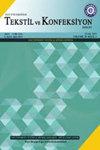不同洗衣参数与破旧、破损、模糊衣物的相关性及微纤维脱落的关系
IF 0.7
4区 工程技术
Q4 MATERIALS SCIENCE, TEXTILES
引用次数: 0
摘要
衣物类型和洗涤参数的影响对国内洗涤过程中微纤维/纤维脱落数量有很大影响。衣物的磨损和损坏是超细纤维污染的重要方面之一。虽然影响MFs脱落的一些因素仍有待探索,因此需要严格的鉴定和量化方法来了解这种脱落。采用不同的洗涤负荷组合及其相应的温度、洗涤时间和搅拌对MFs脱落量的影响。结果表明,回收聚酯羊毛和旧牛仔裤的脱落水平提高了(大约。占总排放量的49%)。当将真实的消费者衣物与实验室衣物进行比较时,消费者家用衣物产生的MFs比实验室测试的织物多110%。高温与洗涤时间的增加呈正相关(p值)本文章由计算机程序翻译,如有差异,请以英文原文为准。
Correlation between Different Laundry Parameters and Distressed, Damaged and Fuzzy Clothing Inrelation to Microfibers Detachment
The influence of the clothing type, and the laundry washing parameters have a huge impact on the number of microfibers/fibers being shed during the domestic laundry trails. Distressed and damaged clothing were identified as one of the important aspects of microfiber (MFs) pollution. Although some of the factors affecting the MFs shedding are still to be explored, thus there is a need for rigorous methods of identification and quantification to understand this shedding. A novel method was adopted using different combinations of wash loads and their corresponding temperature, wash duration, and agitation on the amount of MFs being shed. Results concluded that recycled polyester fleece and distressed jeans showed heightened shedding levels (approx. 49% of total emission). When real consumer laundry was compared to laboratory laundry, consumer domestic laundry is producing 110% more MFs than the laboratory tested fabrics. High temperature and increased wash time have a positive correlation (p-value
求助全文
通过发布文献求助,成功后即可免费获取论文全文。
去求助
来源期刊

Tekstil Ve Konfeksiyon
工程技术-材料科学:纺织
CiteScore
1.40
自引率
33.30%
发文量
41
审稿时长
>12 weeks
期刊介绍:
Tekstil ve Konfeksiyon, publishes papers on both fundamental and applied research in various branches of apparel and textile technology and allied areas such as production and properties of natural and synthetic fibers, yarns and fabrics, technical textiles, finishing applications, garment technology, analysis, testing, and quality control.
 求助内容:
求助内容: 应助结果提醒方式:
应助结果提醒方式:


